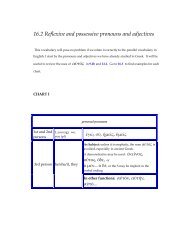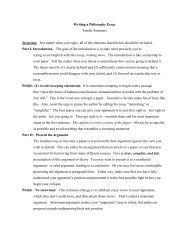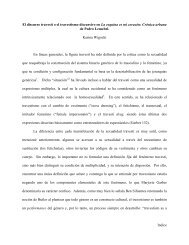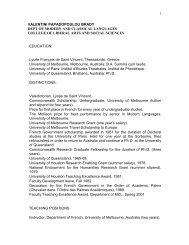Revenge, Justice, and the Law
Revenge, Justice, and the Law
Revenge, Justice, and the Law
You also want an ePaper? Increase the reach of your titles
YUMPU automatically turns print PDFs into web optimized ePapers that Google loves.
40 THE WAYNE LAW REVIEW [Vol. 50:4<br />
While seemingly separate criticisms, <strong>the</strong> two are really dependant upon<br />
<strong>the</strong> validity of one ano<strong>the</strong>r, since under this argument, what makes revenge<br />
immoral on its face, is that it affords no true benefit to society or <strong>the</strong> victim.<br />
If, on <strong>the</strong> o<strong>the</strong>r h<strong>and</strong>, one could point to actual benefits which could arise<br />
from vengeance seeking, one could consequently argue <strong>the</strong> efficacy <strong>and</strong><br />
thus argue, on balance, <strong>the</strong> morality of <strong>the</strong> act. Charles Barton, in his book<br />
Getting Even: <strong>Revenge</strong> as a Form of <strong>Justice</strong>, 167 attempts to do just that.<br />
He takes issue with both assertions, maintaining that <strong>the</strong>re are positive<br />
emotional benefits which may accrue to <strong>the</strong> victim who exacts revenge, <strong>and</strong><br />
that as such, revenge when it fur<strong>the</strong>rs <strong>the</strong> attainment of those benefits, is a<br />
moral response.<br />
For instance, Barton notes that some victims may experience a sense<br />
of relief after exacting <strong>the</strong>ir vengeance. 168 This relief may manifest itself in<br />
a number of ways. First, noting that victims often experience feelings of<br />
humiliation, resentment, <strong>and</strong> anger, he postulates that upon meting out<br />
vengeance, victims can experience a diminution of <strong>the</strong>se “intense <strong>and</strong> taxing<br />
emotions,” <strong>and</strong> thus experience relief since <strong>the</strong>y are no longer burdened by<br />
<strong>the</strong>m. 169 Also, he suggests that a successful act of revenge can offer <strong>the</strong><br />
victim a sense of security; a belief that he will be able to cope , if, sometime<br />
in <strong>the</strong> future, he is once again <strong>the</strong> victim of a crime. Thus one may<br />
experience relief in realizing that he will be able to defend himself, <strong>and</strong> thus<br />
survive, fur<strong>the</strong>r victimization. 170<br />
Ano<strong>the</strong>r emotion which Barton suggests that a revenger may<br />
experience is <strong>the</strong> sense of satisfaction; not in a sadistic sense of<br />
experiencing pleasure from his victimizer’s suffering, 171 but ra<strong>the</strong>r as<br />
experienced by <strong>the</strong> avengers in Littell’s novel, 172 in <strong>the</strong> sense of regaining<br />
one’s sense of self-worth <strong>and</strong> identity. 173 In a similar vein, Professor Robert<br />
167. BARTON, supra note 30.<br />
168. Id. at 17-18.<br />
169. Id.<br />
170. Id.<br />
171. Id. at 18.<br />
172. See supra notes 159-60 <strong>and</strong> accompanying text; see also BARTON, supra note 30,<br />
at 106 (“A very important aspect of this empowerment would be that <strong>the</strong>y [victims] would<br />
be able to establish a relationship of equality vis a vis <strong>the</strong>ir wrongdoers, which would spare<br />
<strong>the</strong>m from <strong>the</strong> role of being helpless victims.”).<br />
173. BARTON, supra note 30, at 18; see also Tamar Frankel, Lessons From <strong>the</strong> Past:<br />
<strong>Revenge</strong> Yesterday <strong>and</strong> Today, 76 B.U. L. REV. 89, 100 (1996) (“Crimes can be viewed as<br />
inflicting a ‘moral injury’ that devalues <strong>the</strong> victims. <strong>Revenge</strong>-like remedies can restore <strong>the</strong>











